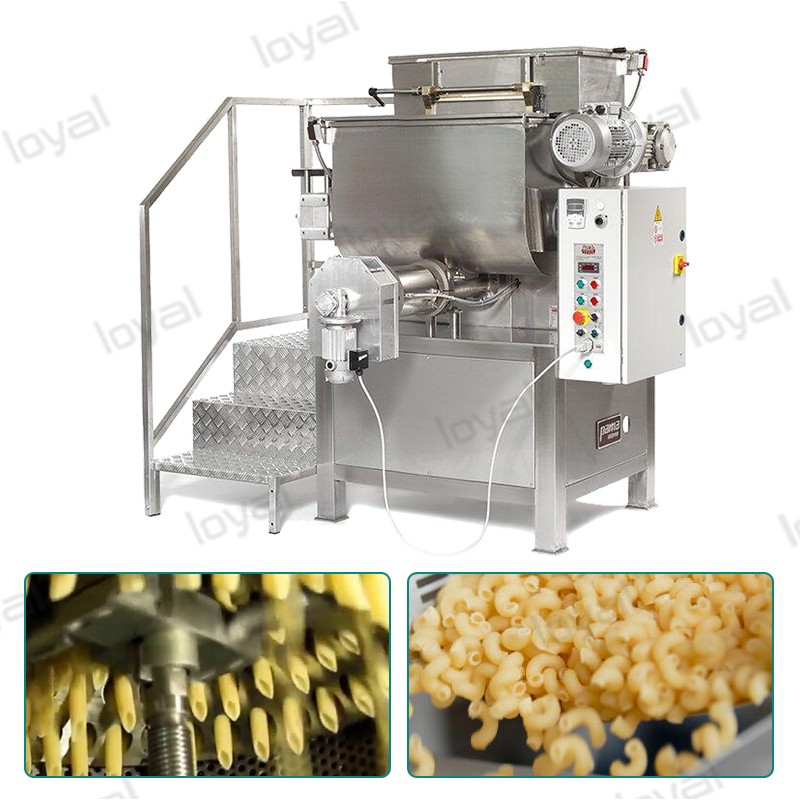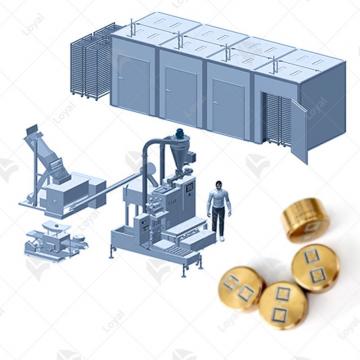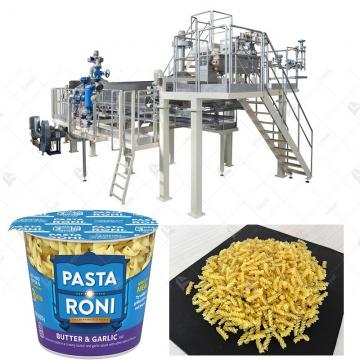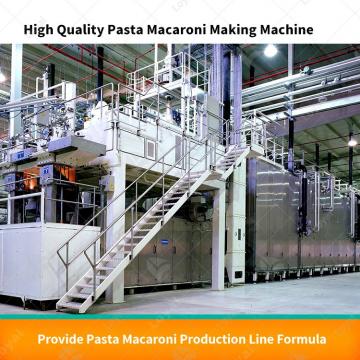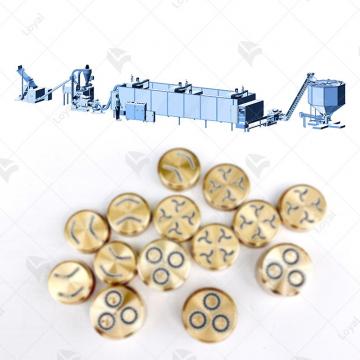Everyhing You Need To Know About Elevate Pasta Production with a State-of-the-Art Fully Automatic Spaghetti Pasta Production Line
Everyhing You Need To Know About Elevate Pasta Production with a State-of-the-Art Fully Automatic Spaghetti Pasta Production Line
In the bustling world of pasta production, where tradition meets innovation, the demand for efficiency and quality has never been higher. The advent of automation in modern manufacturing processes has revolutionized the way pasta is produced, with the Spaghetti Pasta Production Line standing out as a pinnacle of technological advancement.Shandong Loyal Industrial Co., Ltd. has incorporated advanced technologies from Tecalit and SARP in the production of its macaroni.
The pasta production industry has witnessed a dynamic shift over the years, adapting to technological advancements to meet the growing consumer demands. As we delve into the heart of this industry, it becomes evident that the introduction of automated systems has become a game-changer, streamlining processes and enhancing overall productivity.
Automation is not merely a convenience; it is a necessity in the fast-paced landscape of modern manufacturing. The efficiency, precision, and consistency achieved through automated systems are paramount in meeting the stringent standards of the contemporary pasta production industry.

Fully Automatic Spaghetti Pasta Production Line
The fully automatic production line incorporates cutting-edge machinery that encompasses everything from the initial dough preparation to the final packaging. Precision cutting mechanisms ensure uniform spaghetti lengths, meeting the high-quality standards expected in the market.
The heart of the system lies in its automated mixing and kneading processes. This ensures a consistent texture and taste in every strand of spaghetti produced, eliminating variations that may occur in manual processes.
By eliminating manual intervention, the Spaghetti Pasta Production Line achieves unparalleled efficiency. The continuous, automated workflow significantly reduces production time while maintaining optimal quality.
Quality control is at the forefront of automated production. Smart sensors and monitoring systems ensure that each batch of spaghetti meets the predetermined quality standards, adhering to the brand's reputation for excellence.
State-of-the-Art Technology Integration
In this section, we explore the integration of advanced technologies such as robotics and artificial intelligence in pasta manufacturing, highlighting the role of smart sensors in maintaining quality assurance.
The Spaghetti Pasta Production Line leverages robotics and artificial intelligence to optimize the manufacturing process. Robotic arms handle intricate tasks, ensuring precision, while AI algorithms analyze data to fine-tune production parameters for maximum efficiency.
Smart sensors play a crucial role in maintaining quality assurance. They continuously monitor various parameters, such as moisture levels and texture, providing real-time data to the control system. This ensures that each strand of spaghetti meets the exacting standards set by renowned brands.

Optimizing Energy Efficiency
Sustainability is a key consideration in modern manufacturing. In this section, we explore sustainable practices in Spaghetti Pasta Production and the integration of energy-efficient machinery and processes.
Acknowledging the environmental impact of manufacturing, the Spaghetti Pasta Production Line incorporates sustainable practices. This includes responsible sourcing of raw materials, waste reduction initiatives, and environmentally friendly packaging options.
The fully automated production line prioritizes energy efficiency. Through the use of energy-efficient machinery and optimized processes, it not only reduces environmental impact but also contributes to cost savings for manufacturers.
Case Studies and Success Stories
Case studies showcase how renowned brands like Banza, Colavita, Garofalo, Whole Foods 365 Everyday Value, and Jovial have successfully implemented fully automatic Spaghetti Pasta Production Lines. These implementations have resulted in increased production output, improved product consistency, and enhanced overall profitability.
The success stories underscore the positive impact of fully automatic production lines on production output and profitability. Brands that have embraced automation in pasta production have not only met the market demand but have also flourished in a highly competitive industry.
Conclusion
Efficiency, consistent quality control, sustainability, and positive economic impact collectively define the success of the Spaghetti Pasta Production Line. The marriage of technology and tradition has ushered in a new era for pasta manufacturers, setting a benchmark for the industry.
Looking ahead, the future of pasta production technology is likely to witness further integration of artificial intelligence, robotics, and sustainable practices. Manufacturers who embrace these trends will not only meet consumer expectations but will also contribute to a more sustainable and efficient industry.
In summary, the state-of-the-art Fully Automatic Spaghetti Pasta Production Line is not just a technological marvel; it is a testament to the evolution of pasta manufacturing. By elevating production processes, ensuring quality, and embracing sustainability, this innovation paves the way for a future where pasta production is both efficient and environmentally conscious.

FAQs: Frequently Asked Questions about Spaghetti Pasta Production Line
1. What sets the Spaghetti Pasta Production Line apart from traditional methods?
The Spaghetti Pasta Production Line distinguishes itself through the incorporation of automated processes. Unlike traditional methods, which may involve manual intervention, the automated line ensures precision and consistency in every stage of production, from dough preparation to packaging.
2. How does the integration of robotics and artificial intelligence enhance pasta manufacturing?
The integration of robotics and artificial intelligence optimizes pasta manufacturing by automating tasks that require precision and efficiency. Robotics, in the form of robotic arms, handles intricate processes, while AI algorithms analyze data to fine-tune production parameters, ensuring optimal results.
3. Can sustainable practices be realistically integrated into large-scale pasta production?
Absolutely. The Spaghetti Pasta Production Line embraces sustainable practices by responsibly sourcing raw materials, implementing waste reduction initiatives, and adopting environmentally friendly packaging. These practices demonstrate that large-scale production can indeed be environmentally conscious.
4. How do smart sensors contribute to quality assurance in spaghetti production?
Smart sensors play a pivotal role in maintaining quality assurance. They continuously monitor key parameters such as moisture levels and texture, providing real-time data to the control system. This ensures that each strand of spaghetti meets the exacting standards set by renowned brands.
5. What notable brands have successfully implemented fully automatic production lines?
Several notable brands, including Banza, Colavita, Garofalo, Whole Foods 365 Everyday Value, and Jovial, have successfully implemented fully automatic Spaghetti Pasta Production Lines. These implementations have resulted in increased production output, improved product consistency, and enhanced overall profitability.
6. How does the Spaghetti Pasta Production Line contribute to energy efficiency?
The fully automated Spaghetti Pasta Production Line prioritizes energy efficiency through the use of sustainable practices and energy-efficient machinery. This not only reduces environmental impact but also contributes to cost savings for manufacturers, making it a win-win solution

